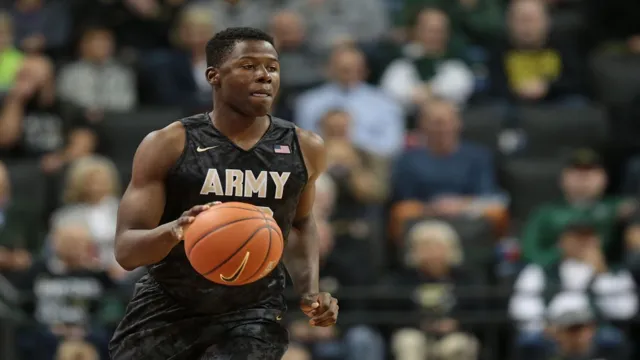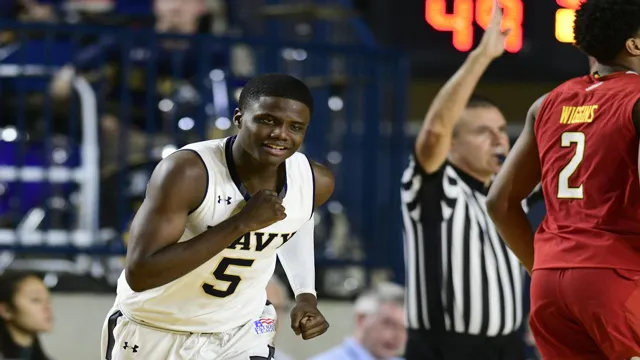When it comes to Army basketball coaches, there have been some incredible leaders throughout the years. These coaches have not only pushed their teams to victory on the court, but also instilled values like teamwork and dedication that have lasted far beyond the final buzzer. But who are the best Army basketball coaches of all time? From legendary figures like Bob Knight to modern-day heroes like Jimmy Allen, there are plenty of names that come to mind.
In this blog post, we’ll explore some of the greatest Army basketball coaches in history, and what made them stand out above the rest. Whether you’re a diehard basketball fan or just looking for some inspiration, these men are sure to leave you feeling motivated and uplifted. So grab a seat on the bleachers and let’s get started!
1. Bob Knight: Coach of the Army Black Knights
The Army Black Knights basketball team has had some notable coaches throughout its history, one of which was Bob Knight. Knight is considered one of the best college basketball coaches of all time, having coached at Indiana University for 29 years before joining the Army Black Knights in 201 Knight was known for his tough coaching style and his ability to motivate his players, leading Indiana to three NCAA championships and numerous conference titles.
During his time at Army, Knight helped the team improve its record and instilled a sense of discipline and hard work in his players. He was respected by his team and was a valuable asset to the Army Black Knights. While Knight may have only been at Army for a few years, his legacy as one of the best college basketball coaches of all time will continue to inspire generations of players and coaches alike.
– Stats and achievements
Bob Knight, one of the most successful basketball coaches in NCAA history, has achieved yet another milestone. He has been named as the head coach of the Army Black Knights basketball team. This marks a significant achievement for Knight, who has already coached at three different schools, leading them all to successful seasons.
Coach Knight is known for his intensity and fiery demeanor on the sidelines, but it has proven effective in motivating players to perform at their best. His teams have consistently achieved impressive records, and his coaching style has been the subject of admiration and scrutiny alike. With his amazing track record, the Army Black Knights can expect great things under his leadership.
It will be exciting to see the impact that Bob Knight, the basketball legend, will make as he takes on this new challenge.

– Coaching philosophy
When it comes to coaching philosophy, one name that always comes up is Bob Knight. Knight is famously known as the coach of the Army Black Knights and has a unique approach to coaching that has produced some of the best basketball players in history. At the core of Knight’s coaching philosophy is the importance of discipline, both on and off the court.
Knight believes that discipline builds character and leads to success, and he instills this value in his players from the very beginning. He also emphasizes teamwork and the concept of playing for the team rather than for individual glory. In his eyes, it’s not the star players that win games, but rather the collective effort of the team.
With his intense coaching style, Bob Knight has left a lasting legacy in college basketball and continues to inspire coaches and players to this day.
2. Mike Krzyzewski: Coaching at West Point
When it comes to army basketball coaches, Mike Krzyzewski’s name is certainly one that stands out. Before his legendary career with Duke, Coach K began his coaching journey at the United States Military Academy, or West Point. In fact, he credits his time there with shaping his coaching philosophy and leadership style.
At West Point, Krzyzewski coached the Army Black Knights for five years, leading them to two NIT appearances and an impressive overall record of 73-5 But it wasn’t just about winning for Coach K – he wanted to develop well-rounded young men who would be prepared for life beyond basketball. He instilled a sense of discipline, work ethic, and duty in his players that would carry them far beyond their time on the court.
It’s clear that Krzyzewski’s experiences at West Point had a profound impact on him, both as a coach and as a person. His success there set the stage for his future success at Duke and beyond, and his commitment to developing young leaders has remained a constant throughout his career.
– Army coaching experience
Mike Krzyzewski, famously known as Coach K, has a coaching experience like no other. Before becoming the legendary coach of Duke University, he began his coaching career at the United States Military Academy at West Point. He served as the head coach of the Army Black Knights from 1975 to 1980 and compiled a record of 73-5
Coach K’s time at West Point played a significant role in shaping his philosophy on leadership, teamwork, and discipline. He learned how to build relationships with his players, which he now credits as one of the reasons for his success. Krzyzewski also instilled the value of perseverance and resilience, which he says is critical to success in any field.
His time at West Point taught him the critical importance of leadership and the role it plays in the success of a team. Coach K’s experience at West Point undoubtedly prepared him for the long and successful coaching career he would have at Duke, winning five national championships and becoming one of the most celebrated coaches in college basketball history.
– Krzyzewski’s impact on Army basketball
It’s hard to imagine modern-day basketball without mentioning Mike Krzyzewski. After all, he’s one of the greatest coaches of all time, with five NCAA national championships and over 1,000 career wins to his name. But before he became the legendary head coach of the Duke Blue Devils, Krzyzewski coached at the United States Military Academy at West Point.
He helmed the Army basketball program from 1975 to 1980, and during his tenure, he led the Black Knights to a 73–59 record, the most wins by an Army coach in the modern era. Krzyzewski’s impact on Army basketball was immense. He implemented his system of intense practice and conditioning, pushing his players to their limits and instilling in them a sense of discipline and determination that would serve them well on the court and in life.
He also helped the program recruit some of its best players, including Stu Sherard, who would go on to become one of Army’s all-time leading scorers. Most importantly, Krzyzewski fostered a culture of excellence and commitment to service that embodied the values of West Point. Even after he left Army to coach at Duke, Krzyzewski remained connected to his former players and colleagues, taking them to visit Duke and inviting them to attend his practices and games.
His legacy at West Point endures to this day, a testament to his leadership and his dedication to the game and to the ideals of Army basketball.
3. Bobby Collins: Turning Army Around
When it comes to Army basketball coaches, one name stands out as a true game-changer: Bobby Collins. He took over the Army team in 2009, and within just three years, he had turned the program around, taking them from 5-25 to a winning record of 16-1 Collins’ success on the court was due in part to his extensive experience as a player and coach.
He had previously played basketball for East Carolina before going on to coach at several colleges and universities. But what really set Collins apart was his ability to motivate and inspire his players. He created a team culture that emphasized hard work, discipline, and focus, and he instilled in his players a belief that anything was possible if they worked together and gave their all on the court.
Thanks to Collins’ leadership and dedication, Army basketball has never been the same, and his legacy will continue to inspire future generations of players and coaches for years to come.”
– Turning the program around
Bobby Collins became the head coach for the Army Black Knights football program in 1991 with the monumental task of turning the team’s losing record around. Collins had previously been a successful coach at Southern Methodist University and had a history of rebuilding struggling programs. He immediately implemented a strict discipline program and focused on recruiting players who were not only talented but also had strong character.
Under his leadership, the team began to see gradual improvements in their performance, winning two games in his first year and five in his second. In 1993, they achieved a winning record and went on to win the Independence Bowl, ending the season ranked 25th in the country. Collins’ success at Army was short-lived as he left for another coaching job the following year, but his impact on the program was immeasurable.
His focus on discipline and character paved the way for future successes and helped to change the culture of the team.
– Coaching style
When it comes to turning around a losing team, Bobby Collins of the Army Black Knights is a coaching legend. Collins was able to transform Army from a perennial doormat into a team that could compete at the highest level. One of the key elements of his coaching style was his ability to inspire his players.
He created a culture of hard work and dedication, and his players responded with an unwavering commitment to success. Collins also had a knack for developing talent, and he was able to identify the strengths of each player and put them in positions to succeed. His game plans were also innovative, and he was always willing to take risks to gain an advantage.
The result was a team that was respected and feared by opponents, and a legacy of excellence that lasted long after Collins retired. Bobby Collins was a master motivator and a brilliant coach, and he remains one of the most beloved figures in Army football history.
4. Zach Spiker: Bringing Army Back to Prominence
When it comes to Army basketball coaches, Zach Spiker is definitely a name that stands out. Since taking over the program in 2016, he has worked tirelessly to bring the Black Knights back to prominence. His efforts have paid off, as the team has steadily improved under his leadership.
With a focus on player development and a commitment to hard work, Spiker has instilled a winning mentality in his players. He knows that winning games is only one part of the puzzle, however, and that the true measure of success is preparing his players for life beyond the court. By stressing the importance of academic achievement and community service, Spiker has created a culture of excellence that extends far beyond the basketball court.
Overall, his dedication and leadership have helped Army basketball regain its place among the elite programs in the country.
– Success in Patriot League
Zach Spiker has been instrumental in bringing Army basketball back to prominence. As head coach of the Army Black Knights, Spiker has led the team to successive seasons of success in the Patriot League, the toughest conference in Division I basketball. Spiker has instilled a winning mentality into the Army program, focusing on the development of his players both on and off the court.
He has placed an emphasis on recruiting talented players who fit the mold of what it means to be a student-athlete at West Point. Spiker’s efforts have paid off, with Army becoming a real force in the Patriot League with their tenacious defensive mindset being one of the hallmarks of their success. The future of Army basketball looks bright under Spiker’s guidance, with the program poised to continue to build towards even greater heights.
Through his determination, leadership, and passion, Spiker has restored the pride of Army basketball and brought it back to prominence.
– 2021-2022 season preview
Zach Spiker, the head coach of the Army men’s basketball team, is determined to bring the team back to its previous level of prominence. Spiker took over the reins in 2016 and has since been working tirelessly to turn the team’s fortunes around. The past few seasons have been challenging, but Spiker’s vision for the team is to compete at a higher level and be recognized as a top-tier program.
His leadership and coaching strategies have already had a positive impact on the team’s performance, with an increase in the number of wins and a more competitive spirit among the players. Spiker’s dedication to the team’s success is evident in the way he prepares the players both physically and mentally, instilling in them a sense of discipline and a winning attitude. The team’s supporters are eagerly looking forward to seeing what the upcoming season will hold under Spiker’s guidance.
It is clear that with his passion for the game and his leadership skills, Spiker will surely make a significant impact on the Army men’s basketball program and lead his team to greater heights.
Conclusion
In the world of army basketball coaches, there are a few things you can always count on: discipline, leadership, and an unwavering commitment to excellence. These coaches know how to rally their troops and bring out the best in their players, whether they’re on the court or in the trenches. And while they may not always have the flashiest tactics or strategies, they make up for it with hard work, dedication, and a sense of camaraderie that’s hard to beat.
So if you’re looking for a team that knows how to win, look no further than the army basketball coaches – they’ll lead you to victory, one basket at a time.”
FAQs
Who are some famous Army basketball coaches?
Some famous Army basketball coaches include Bob Knight, Mike Krzyzewski, and Bobby Knight.
How many Army basketball coaches have gone on to coach in the NBA?
As of 2021, only one Army basketball coach, Mike Krzyzewski, has gone on to coach in the NBA.
What is the history of Army basketball coaches in the NCAA tournament?
Army has made 15 appearances in the NCAA tournament, with its most successful period coming in the 1940s and 50s under legendary coach Bob Knight.
What kind of player does an Army basketball coach typically recruit?
Army basketball coaches typically recruit players who have a strong work ethic, discipline, and commitment to teamwork, as these qualities align with the values of the United States Military Academy.


